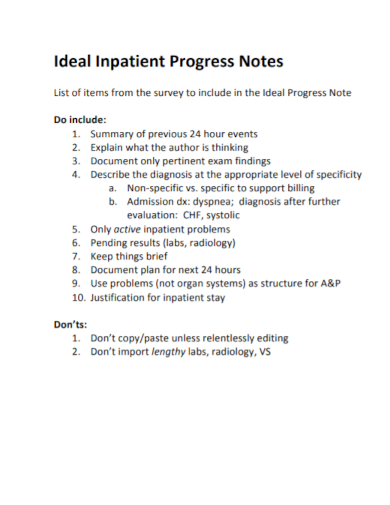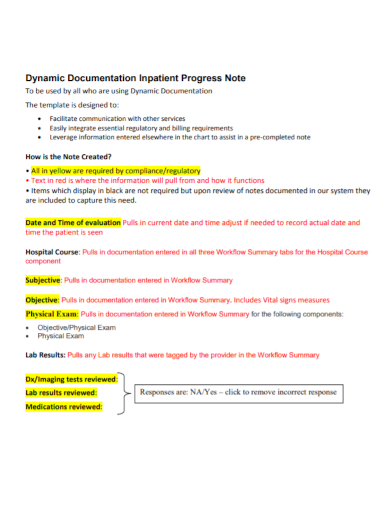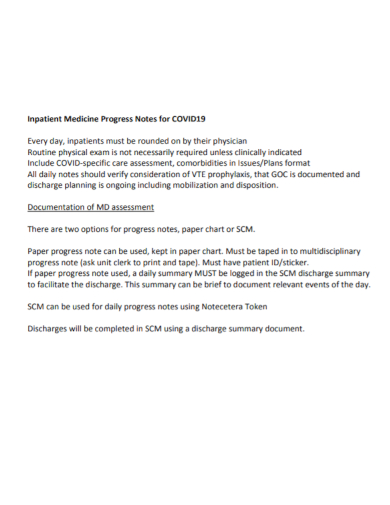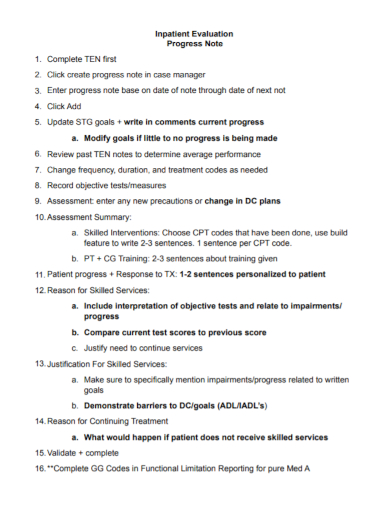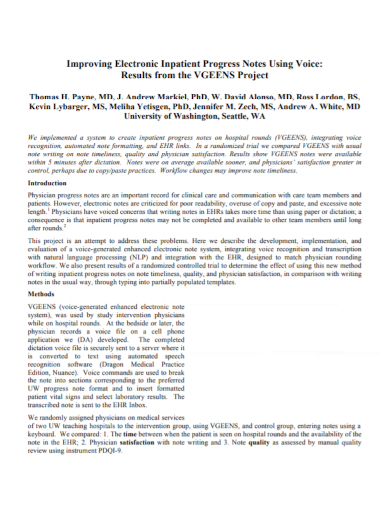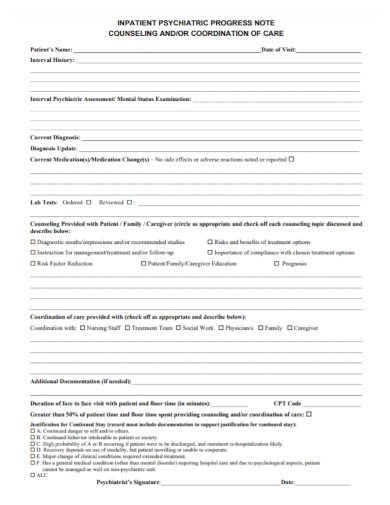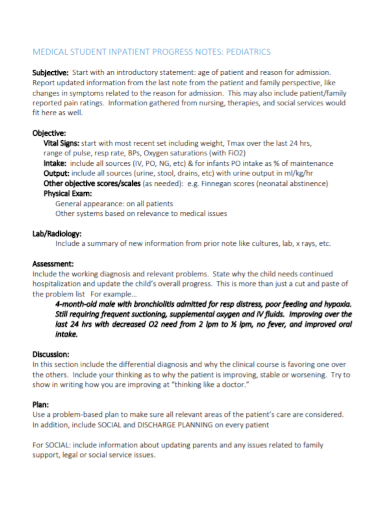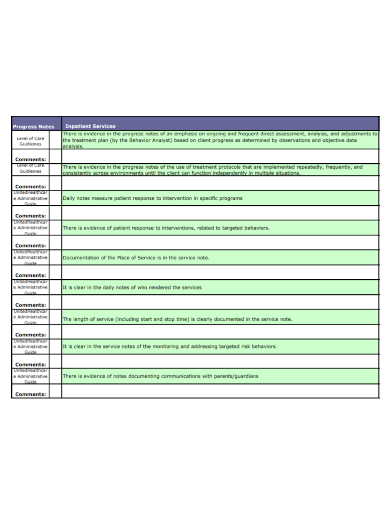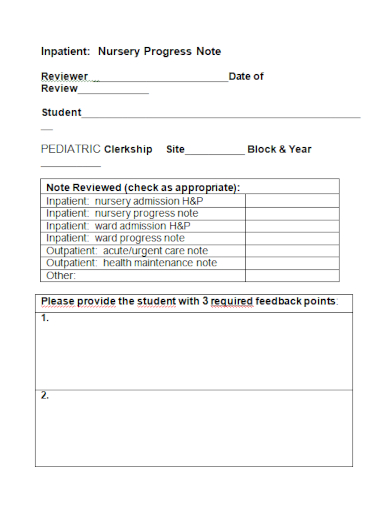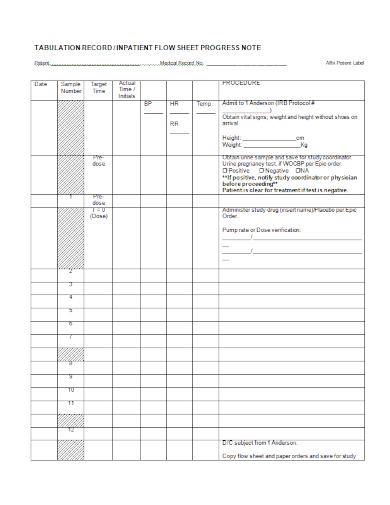For physicians to diagnose the patient’s illness correctly and give them the proper treatment and medication to make their situation better, progress notes are important documents because it records all the observation that a patient is feeling and behaving while being hospitalized. For progress notes to be effective, they need to be written accurately and concisely. This article will show you how to make an inpatient progress note.
9+ Inpatient Progress Note Samples
1. Ideal Inpatient Progress Note
2. Documentation Inpatient Progress Note
3. Inpatient Medicine Progress Note
4. Inpatient Evaluation Progress Note
5. Electronic Inpatient Progress Note
6. Inpatient Psychiatric Progress Note
7. Medical Student Inpatient Progress Note
8. Inpatient Services Progress Note
9. Inpatient Nursery Progress Note
10. Inpatient Flow Sheet Progress Note
What is an Inpatient Progress Note?
Tips on Writing Progress Notes
1. Always Check That You’re Writing in the Correct Person’s Notes
Make sure you have the correct person’s name and date of birth when you’re writing the patient’s progress notes. This will ensure avoiding duplications or misleading information.
2. Write Legibly
Blue and black pens are the colors of preference for legal documents since they photocopy well. Other pen colors are not permitted because they are harder to read and they look less formal. Remember that an inpatient note is a formal document. Your notes should be written clearly and legibly. Make sure you use capital letters or block scripts to make your handwriting easier to read.
3. Note the Date of Your Entry and Sign Them
Write the date and time of the new entry you’ve written. At the end of your notes, write the signature of your initials to know that you’ve noted the progress and it also minimizes the possibility of anyone adding additional notes after yours.
4. Put a Reminder if the Progress Note Exceeds a Page
Most progress notes only take one page, but if you need to write more than one page, highlight that the note continues at the next page by putting that reminder at the end of the page. This will aid the reader that there is an additional page that they may get important details.
5. Use the Correct Terms
When you describe anything, especially the patient’s situation or current behavior or diagnosis, make sure you use the correct term. There are a lot of words that sound the same or spelled almost the same, so make sure to review your notes before submitting them. Use a dictionary or ask a colleague to ask for the meaning of a certain word you’re not sure that you would use. Putting incorrect terms can result in misdiagnosing and mistreating. Don’t forget to write in simple sentences to make your notes understandable.
6. Avoid Using Acronyms and Abbreviations
As much as possible, use the complete word/s whenever possible and avoid using abbreviations or acronyms, to prevent misinterpretation. If you need to use abbreviations, refer to the approved list of abbreviations since they are the only ones allowed to be written in the progress note.
7. Keep Your Notes Objective
Make sure your entries only state the facts. Make sure to be objective as much as possible. Only list down your objective observations. Avoid putting assumptions, judgemental language, or red flag terminology in your notes.
Details to Include in an Inpatient Progress Note
All progress notes must include the following information:
- Your name as the note taker
- Name of the patient and their birthdate
- The date and time your note is written
- Visits from their physician
- Interventions or any assistance being given
- Changes in their emotional, physical, and mental wellbeing
- Behavior of concern
- Reaction to medications
- Concerning changes in physical appearance
- Dietary notes
FAQs
What are the purposes of an inpatient progress note?
The purpose of a progress note is to:
- To act as a working document for daily recording of patient care
- To record the account of the patient’s illnesses and the approach to diagnose and treat the illness
- To record the risk assessments undertaken to protect the patient
- To record any factors that affect the patient’s response to treatment
- To record all advice given to general practitioners and other clinicians
- To store these records for patients to have access
- To inform medico-legal investigations, clinical, audit, and governance accreditation
What is the difference between inpatient and outpatient care?
The difference between inpatient and outpatient care is the duration of the patient’s stay in the hospital or any medical facility. Inpatient care requires overnight or several days of hospitalization while outpatient care does not stay in the hospital overnight.
How often progress notes must be recorded?
Progress notes need to be written every day for the whole duration of the patient’s stay.
[/ns_row]
Whenever you take down details of every progress note you’re writing that all information is factual, accurate, and specific and that you didn’t leave out any important detail. Review the progress note before sending it to other nurses or physicians to use for reference and safekeeping. To help you get started writing the inpatient progress note, download the free sample templates provided above to use as your guide.
Related Posts
FREE 9+ Medical Note Samples
FREE 8+ Sample Soap Note
FREE 8+ SOAP Note Samples
FREE 8+ Nursing Note Templates
How to Make a Doctor's Note for Work?
FREE 6+ Substance Abuse Discharge Plan Samples
FREE 6+ Goods Delivery Note Samples
FREE 35+ Doctor Note Templates
FREE 17+ Sample Doctors Note
FREE 15+ Sample Doctor's Note
FREE 10+ Patient Medical Report Samples
FREE 9+ Sample Daily Note
FREE 9+ Sample Subjective Objective Assessment Planning Notes
FREE 7+ Sample Progress Notes for Social Workers
FREE 6+ Return to Work Note Samples

